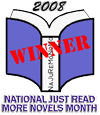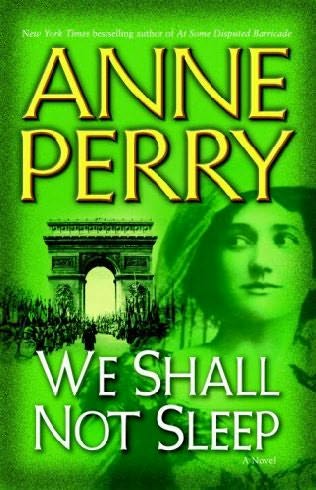
 by Anne Perry
by Anne PerryMy first finished book of 2008 may just wind up being my favorite at the end of the year. At least, I would not be surprised if it did.
Anne Perry has long been in my top 10 favorite authors. It's with exuberance that I review this, the fifth and last, in her acclaimed World War I series. The overall mystery that ran throughout the series covering the length of the war was discovering who the 'Peacemaker' was and stopping him before he succeeded in his plan for world peace and dominance. There was within each book a separate mystery that was solved within the time frame of the book.
In book five a nurse is brutally murdered and two innocent people are blamed. The Reavley siblings must discover who it is in order to take care of some secret service work before the war ends. And the end is soon approaching. A young lady the reader knows well from other books was raped and she may be the only one who can shed light on who the real murderer is, but if she comes forward she could loose the love of her life. Perry provides real insight into the feelings of people in the early part of the century towards rape victims.
I seldom cry during movies or books, but I was choked up several times while reading We Shall Not Sleep. I stayed up until the wee hours of the morning to finish the book. After doing so, I crawled in bed beside my sleeping husband and thanked the Lord that he never had to personally experience war. And my heart wept for those who suffered and who still battle today for freedom.
Perry wrote a powerful series. The mysteries are captivating, the history is well-depicted, and the storyline is well constructed. I marked a kazillion passages to reread at the end. I love putting a little bookdart* at a thought or passage that I want to reread at the end of the book. It refreshes the ideas and allows me to think of them again but with the end of the book in mind.
When talking with the Peacemaker, Mason (a war correspondent) became aware of the conflicting beliefs of Joseph Reavley and the Peacemaker. "The Peacemaker had argued over and over that the greater end justified the smaller ugliness of the means. Joseph Reavley had said that the means were inextricably bound into and part of the end. Being a chaplain, he had put it in religious terms. He had said that if you picked up and used the devil's tools, you had already served his purpose, because using them had changed you, and that was all he wanted."
In this passage the flaw of the Peacemaker's plan is contemplated by Mason.
"The Peacemaker had begun with such high, clear ideals. They would broker peace, prevent the slaughter and ruin of war, at a relatively small price. Except that it was not a small price. They had not seen then that the lack of open war is not the same thing as peace. There are internal prices to pay that create a different kind of war, another sort of destruction. . . It wasn't nationality that was the issue. It was the passion and belief of the individual, the right to rule himself in the manner of his choice, the chance to be different, funny, inventive, to learn anything and everything, to question, to make mistakes and to start again."At one point Matthew Reavley (Secret Intelligence) is recruiting Mason's help and tells him of the Peacemaker's plans.
"It would be peace, but without any passion or individuality, any freedom to think and question, to be different to dare new ideas, to complain against stupidity or injustice, to question or work or laugh aloud. It would be the peace of death. . . He still hasn't learned that you can't force people without at the same time destroying them."Joseph often refers to Dante's Inferno. Here he has a brief insight of his study of that book.
"It's Dante again - Rewarded not for what we do, but by it--and by what we see, and what we see others do."Joseph confronting the Peacemaker.
"There would always have been some who would pay for the freedom for us to make our own laws, speak our differences aloud, follow the faith we choose . . . If we pay with our lives, then so be it. We will not pay with the slow death of our minds or the withering of our souls."Though there are more, I will only share one last kernel.
"Great men use power as little as possible."*I bought several tins of bookdarts for Christmas presents and they sent me a couple of extra sleeves. If you would like to win a sleeve of 12 or so bookdarts, make a comment and I will draw for a winner on Sunday, January 13.
6 comments:
What a great review. You wrote so that we can really tell how much you enjoyed this book. I haven't read Anne Perry, sometimes I think I've been under a rock somewhere...
I have read a lot of Anne Perry books, but have not read this particular series yet. I'm glad to hear that you enjoyed it and I'll have to pick up the first book sometime soon.
I've read her other two series with Monk and Latterly and Pitt and Charlotte, but I have neglected this series. Your review encourages me to go ahead and begin this one!
I've never read any of Perry's books. But, you make me want to pick up this series and give her a try. I really like historical fiction and mystery, so this sounds great! Thanks for the review.
This sounds like a great series. I often think about giving Perry a try when I shelve her books. Are they all about WWI or does she do another series with WWII? Either way, I'll eventually get to them.
Lovely review.
Paula, I think this may be Perry's best book.
Kay, if you like Perry's other books, I think you will love this series.
Jenclair, this series is my favorite of her stuff.
Lisa, Perry does an outstanding job of writing period pieces.
Les, there are only 5 books in her WWI series and they are all published. Her early work is Victorian mystery.
Post a Comment